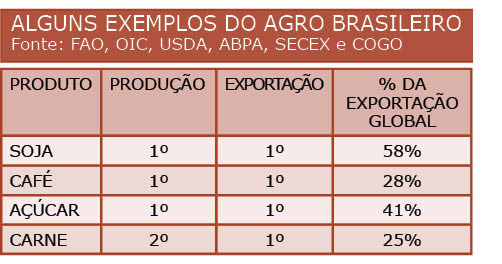Luiz Carlos Corrêa Carvalho, Caio
Presidente da Abag e Diretor da Canaplan
OpAA75
Estabilidade e confiança nas políticas públicas
“O tempo não é renovável”
Autor desconhecido
O campeão mundial da biomassa competitiva é o Brasil. Várias safras na mesma área, no mesmo ano! Crescimento anual de 3%, em produtividade, é muito inspirador. Nessa Copa do mundo de competitividade, os juízes são selecionados de acordo com os interesses dos países europeus, com alguns de outros países ricos (e não tem VAR). Aos emergentes, essas regras são no sentido de proteção aos mais ricos para que prosperem. As guerras reforçaram as regras, e o mundo ficou mais pobre quando se trata de produtos do agro.
No entanto, mesmo com regras assim, o Brasil segue batendo recordes em produção e exportação. Afinal, levando em consideração os resultados, dá para entender que eles precisem fazer algo como precaução (do lado do competidor subsidiado). Os europeus produziram o Green Deal, e os norte-americanos preparam algo. Enquanto isso, cabe ao Brasil reagir às narrativas ao agro brasileiro, preparadas pelos colonialistas europeus, que lhes interessam (e que nos sufocam).
 Tanto o Green Deal como o que virá dos EUA seguem a linha de regrar o mundo. Muitas tentativas disso são feitas, mas o seu sucesso depende da reação de outros blocos ou países. O protagonismo brasileiro em relação ao “mundo da biomassa” é real e precisa ser efetivo. Isso, sem dúvida, requer posicionamento de Estado, chamamento ao esforço público-privado e liderança efetiva do Brasil.
Tanto o Green Deal como o que virá dos EUA seguem a linha de regrar o mundo. Muitas tentativas disso são feitas, mas o seu sucesso depende da reação de outros blocos ou países. O protagonismo brasileiro em relação ao “mundo da biomassa” é real e precisa ser efetivo. Isso, sem dúvida, requer posicionamento de Estado, chamamento ao esforço público-privado e liderança efetiva do Brasil.
Quando se fala em políticas públicas globais, em fase de organizações internacionais multilaterais (cite-se ONU, OMC e OCDE, entre outras), a fragilização dessas entidades requer forte posicionamento de cada país na defesa do que julga correto e pertinente. Imagine um bloco de países tratando de impor uma política pública global que fira políticas públicas nacionais, no coração. Isso existe? Claro, o Green Deal europeu não considera o desmatamento legal em seu documento.
Imagine um bloco de países tratando de definir uma política mundial com base na sua realidade de clima. Isso existe? Sim, o Green Deal trata o mundo tropical (o dos latinos) como se fosse o mesmo para o mundo temperado (o dos europeus). O Brasil enfrentará isso e vai lutar, mesmo assim, pelo Acordo EU–Mercosul. Isso significa uma importante revisão, do lado europeu, da forma unilateral como quer tratar uma questão multilateral.
Enquanto as políticas globais mostram a relevância do diálogo, das articulações voltadas à paz e ao equilíbrio comercial, é essencial que cada país tenha as suas políticas públicas estáveis e que gerem a confiança fundamental aos agentes do mercado. Todo o esforço global, com aprovação formal efetivada, está voltado à luta contra as mudanças climáticas e à descarbonização, como forma efetiva de se buscar as metas individuais de mitigação das emissões dos gases do efeito estufa, assim como de se manter ações no comércio que não deem espaço à nova onda protecionista/precaucionista.
Essa linha de pensamento, sempre defendida pelo Brasil, requer compromissos e políticas internas estáveis. Ao se olhar para a “irmã” mais nova do agro brasileiro, a bioenergia, tem-se muitos ângulos a conferir, se o país realmente quer manter o seu protagonismo no tema. Enquanto o etanol tem, juntamente com o biodiesel, a legislação nacional da energia renovável – RenovaBio – a ser seguida, o executivo público tem a caneta a ameaçar a estabilidade do processo de desenvolvimento dessas cadeias produtivas.
Em tempos de petróleo a US$ 100/b, o executivo público busca medidas para atenuar o impacto dos preços altos ao consumidor. Todo um esforço que resulta, por exemplo, em MPs (muitas vezes inconstitucionais, como a recente extensão da desoneração PIS-COFINS e CIDE nos combustíveis), ou em redução do nível de mistura do biodiesel no diesel, ou mesmo em se mudar a política de correção dos preços desses combustíveis sem o conhecimento dos atores setoriais. Colocam-se ou se retiram impostos de importação, na pressão de países.
Em tempos de petróleo a US$ 100/b, o executivo público busca medidas para atenuar o impacto dos preços altos ao consumidor. Todo um esforço que resulta, por exemplo, em MPs (muitas vezes inconstitucionais, como a recente extensão da desoneração PIS-COFINS e CIDE nos combustíveis), ou em redução do nível de mistura do biodiesel no diesel, ou mesmo em se mudar a política de correção dos preços desses combustíveis sem o conhecimento dos atores setoriais. Colocam-se ou se retiram impostos de importação, na pressão de países.
Durante o governo Temer, foi criada uma série de ações, como o RenovaBio e o Rota 2030, posteriormente regulamentadas e confirmadas no governo Bolsonaro, para uma plataforma veicular voltada à busca integrada de motores flexíveis e híbridos (combustíveis do futuro), com a meta do hidrogênio verde nas células de combustível.
Houve o aplauso e a atuação da Anfavea e de entidades setoriais de bioenergia, mas, de novo, dependerá da nova caneta para 2023-2026. O desenvolvimento tecnológico, a inovação e as ações privadas estão se movendo em um frenesi nunca visto. Certamente, vão gerando impactos que o governo e o legislativo têm dificuldade de ir adaptando as regras do jogo, muitas delas de meados do século XX.
Um exemplo disso é o mundo digital, a internet das coisas, o esforço de conectividade nas fazendas no País, a produção de biogás ou biometano. Na mesma linha, segue a lenta ação de aprovação de novas moléculas químicas ou produtos biológicos para o controle de pragas, doenças e ervas daninhas nas lavouras. A cana-de-açúcar se casa com o milho, e, obviamente, é uma nova integração que o mercado adora, mas o governo leva tempo para se ajustar a ela.
É preciso integrar, mas não é fácil fazê-lo com o mesmo tema sendo conduzido por vários Ministérios de diferentes matizes ideológicas e de partidos políticos competindo por espaço. As mudanças globais não esperam reações lentas e não têm paciência com atrasos. No caso da bioenergia, o enfrentamento é constante e precisa da união dos esforços do governo e das entidades de classe no planejamento e na execução das medidas que estimulem, assegurem investimentos e modernizem as relações público-privadas internamente para o diálogo com terceiros países. Enquanto a defesa das entidades internacionais multilaterais é fundamental ao Brasil, a segurança aos investimentos internos é fundamental à capacidade competitiva da biomassa, requerendo a estabilidade e a menor intervenção do governo nas regras do jogo.
Desse modo, enquanto o pêndulo comercial tente novamente ao Oriente, para o Brasil, deve-se refletir que as nossas raízes são ocidentais, e o nosso mundo está assentado em bases democráticas. Isso não significa escolhas, se refere tão somente ao fluxo comercial internacional. É difícil crer que o mundo rico siga vendo autocracias crescerem, e os líderes mundiais (G7) terem dificuldade de buscar o diálogo, no mundo ocidental, equilibrado e sensato.
Olhando internamente, salta aos olhos a dificuldade dos governos brasileiros, que passam sem entender o fator agroenergia, o seu sucesso e a necessidade de tratá-la com estabilidade, que atrai o investimento, no caminho asfaltado pela confiança. Em um mundo onde a descarbonização é prioridade comum, o Brasil está à frente. Basta, assim, afiar melhor seu detalhe positivo às políticas públicas setoriais.




